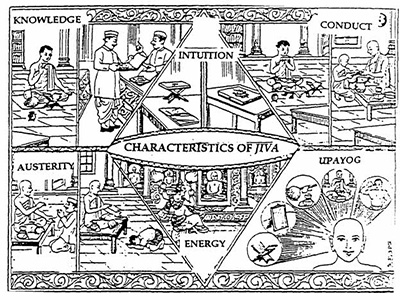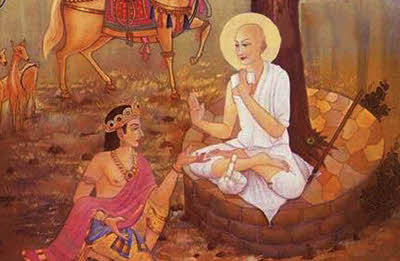
Good conduct is defined as the rejection of sinful activities. It is twofold: partial (desavirati) and total (sarvavirati).39 The five lesser vows (anuvrata), the three meritorious vows (gunavrata), the four disciplinary vows (siksavrata) are considered the twelve fold partial reduction. Among these, avoidance of injury, lying, stealing, impurity, and possessions in their grosser forms are called by the Jinas the ‘lesser vows.’ The three ‘meritorious vows’ are: the limitation of travel, the limitation of things of single and repeated use, and the limitation of purposeless injury. The four ‘disciplinary vows’ are tranquility, limitation to one place, fasting, and living like a muni, the distribution of alms. This partial-rejection belongs to those householders who possess the attributes of a desire to hear, etc.,40 devoted to the duties of monks,41 desiring to take food* benefiting Dharma, who have attained right belief characterized by tranquility (sama), desire for emancipation (samvega), indifference to worldly objects (nirveda), compassion (anukampa), and faith in the principles of truth (astikya), who are entirely free from false belief, noble-minded, devoid of the maturing of permanent anger42 by destruction of conduct-deluding karma.
The avoidance of injury, etc., both gross and otherwise (i.e., fine), that is total rejection (of sinful activities), the stairs to the palace of emancipation. This belongs to noble-minded munis who have slight passions by nature, are indifferent to the pleasures of existence, and devoted to the qualities of Reverence, etc.
That is called penance (tapas) that burns away karma. Outer penance is fasting, etc., and inner is confession and penance, etc. Fasting (anasana), partial fasting (aunodarya), limitation of food (vrtteh sanhksepana), giving up choice food (rasatyaga), bodily austerities (kayaklesa), and avoidance of all useless motion (Samlimta) are called outer penance. Confession and penance (prayascitta), service to others (vaiyavrtta), study of sacred texts (svadhyaya), Reverence (vinaya), indifference, to the body (vyutsarga), good meditation (subhadhyana) are the six fold inner penance.
State of mind (bhavana=bhava) is devotion solely to the possessors of the three jewels, service to them, only pure thoughts, and disgust with existence. This fourfold Dharma, producing boundless fruit must be observed with care by those who fear* wandering through births.”

Dhana said, “Master, I had heard of this Dharma long ago. For so long a time, I have been deceived by my own karma.” After he had paid homage to the guru’s lotus feet and to the other munis, considering himself blessed, the merchant returned to his own abode. Absorbed in deepest joy from this sermon on Dharma, Dhana passed the night like a moment. When he arose from sleep at dawn, the panegyrist, charming with a tone of voice deep and sweet like a conch shell, recited:
Night, gloomy from the darkness of clouds, thief of the beauty of the lotuses, has passed like the rainy season, the thief of men’s exertions. Dawn with the sun with its increasing Splendor, aiding men’s exertions, has now appeared, as well as the autumn. The waters of pools and rivers have become clear from autumn, like the minds of wise men from enlightenment by the supreme principles. The roads have become very easily passable with their mud dried up by the sun’s rays, like the scriptures with their doubts resolved by instruction from acharyas. The rivers flow between their banks very slowly, like trains of carts inside wheel tracks.
Now the roads show hospitality, as it were, to travelers by ripe millet, wild rice, cucumbers, jujube fruit, etc. The autumn announces, as it were, by the sound of the thickets of sugar cane rocked by the wind, a suitable time for the effort of departure for those intent upon departure. The autumn-clouds at once become umbrellas for travelers burned by the sun’s rays. The oxen of the caravan crush the high ground with their humps, as if to destroy the unevenness of the earth to make traveling easier. The rivers on the road, which appeared formerly roaring and flooding the earth, have disappeared like the clouds of the rainy season. Now the roads provide travelers with provisions without effort by means of their creepers bent with fruit and clear water at every step. The merchants here with their minds filled with energy, hasten to go to foreign countries like king-geese.
When he heard that, the merchant thought, “He has proclaimed the time suitable for departure,” and had the departure drum sounded. At the sound of the drum filling heaven and earth, the caravan set out like a herd of cows at the sound of a cow-herd’s horn. The Suri set forth then also, surrounded by sadhus, like the sun by rays, engaged in awakening the lotuses of Souls capable of emancipation. The caravan-leader Dhana set out, after he had himself provided for protection of the caravan by guards in front, at the rear, and at the sides. After the caravan had crossed the great forest, the best of acharyas took leave of the caravan-leader and went elsewhere to wander. Then the merchant, traveling without hindrance, arrived at Vasantapura, like the current of a river at the Ocean. In a short time he sold his merchandise and took exchange goods. For the wise work quickly. Heavily laden with it, like a cloud from the Ocean, Dhana returned to the city Ksitipratistha. In the course of time, when the term of his life was completed, he died.











No comments yet.
Leave a comment